Posts by Christopher Lochhead
161 Adobe is Smart & Wall Street is Dumb: Why the $60B Figma Acquisition is Legendary Category Design

Podcast (lochheadonmarketing): Play in new window | Download (Duration: 19:04 — 13.1MB) | Embed
Subscribe: Apple Podcasts | Spotify | RSS | More
On September 15 2022, Adobe announced it was buying startup Figma for 20 billion US dollars. This is one of the largest private company purchases in Silicon Valley history. They paid approximately 50 times Figma’s 2022 revenue, and Wall Street hated it.
Skeptics are saying that Adobe paid an “astronomical price” for a company projected to book only 400 million in ARR annualized reoccurring revenue this year. And this is exactly what people who do not understand how categories work. The “experts” on Wall Street when deals like this go down, are almost always wrong.
Welcome to Lochhead on Marketing. The number one charting marketing podcast for marketers, category designers, and entrepreneurs with a different mind.
Wall Street Mercenaries
Let’s start off with an interesting tidbit that I experienced by interacting with Wall Street.
As I was doing a little bit of consulting and insulting back then, a group approached me about their matchmaking service. Simply put, they would match executives and experts to Wall Street folks, and they pay for your time so they could ask you questions and advise on certain things.
The idea intrigued me, so I signed up for it. But it turns out, the Wall Street guys only wanted to ask for speculations and opinions on certain company’s performance and how it would affect the market, what stocks were going to tank, etc.
The AHA here is that most people (this is a generalization) in Wall Street are mercenaries. They’re looking to make money in the now term, short term. They don’t create a significant value in the economy. They just try to anticipate what might happen tomorrow, so that they can play a financialization game.
While there are exceptions to this, it’s generally the perception most people have of them.
How to Confuse a Wall Street Folk
As we’ve discussed before, there are two kinds of acquisition deals when you look at them from the high level. There are consolidation deals and acceleration deals.
Consolidation deals happen when a certain company is not growing anymore, and their solution for it is to merge with another company to get a bigger share of the market and look like they have “growth”. Value investors like the Wall Street folks typically thrive and look out for such deals, as it fulfills their requirements for “growth” and revenue increase.
Acceleration deals is when a company acquires another because they see value on it once they have developed it. They company or IP they purchased may not have a huge valuation at the moment, but it could be a gold mine for them once it is fully fleshed out.
Acceleration deals tend to confuse Wall Street folk, as they are focused in the “now”, and could not fathom the significance of such a deal entails, unless it affects the current quarter. Hence, they do not understand what Adobe did, which is why they hate it.
To hear more about the Adobe deal and why Wall Street folks hate it, download and listen to this episode.
Bio
Christopher Lochhead is a #1 Apple podcaster and #1 Amazon bestselling co-author of books: Niche Down and Play Bigger.
He has been an advisor to over 50 venture-backed startups; a former three-time Silicon Valley public company CMO and an entrepreneur.
Furthermore, he has been called “one of the best minds in marketing” by The Marketing Journal, a “Human Exclamation Point” by Fast Company, a “quasar” by NBA legend Bill Walton and “off-putting to some” by The Economist.
In addition, he served as a chief marketing officer of software juggernaut Mercury Interactive. Hewlett-Packard acquired the company in 2006, for $4.5 billion.
He also co-founded the marketing consulting firm LOCHHEAD; the founding CMO of Internet consulting firm Scient, and served as head of marketing at the CRM software firm Vantive.
We hope you enjoyed this episode of Lochhead on Marketing™! Christopher loves hearing from his listeners. Feel free to email him, connect on Facebook, Twitter, Instagram, and subscribe on iTunes!
289 The Secret Life of Secrets with Columbia Professor & Bestselling Author Michael Slepian
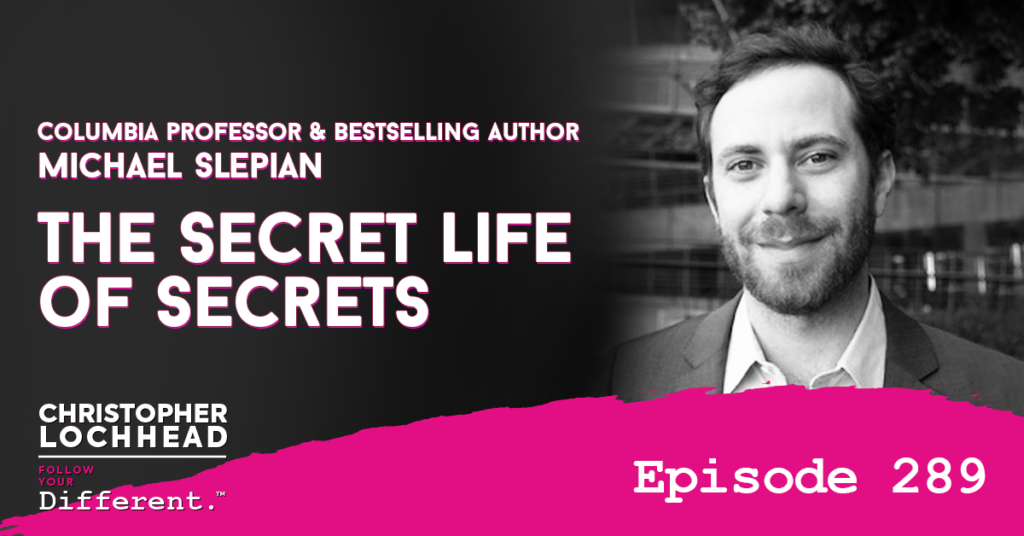
Podcast: Play in new window | Download (Duration: 57:44 — 39.6MB) | Embed
Subscribe: Apple Podcasts | Spotify | Pandora | RSS | More
On this episode of Christopher Lochhead: Follow Your Different, we talk about something that every single one of us has, very few of us think or talk about, and it’s something that can have a profound impact on our lives. So let’s talk about Secrets with our guest, Michael Slepian.
Michael Slepian is an Associate Professor of Leadership and Ethics at the legendary Columbia University. He’s also a recipient of the Rising Star Award from the Association of psychological science. Michael is considered by many to be the leading expert on the Psychology of Secrets.
He’s got a brand-new best seller out called The Secret Life of Secrets, which we will get into this episode and much more.
Michael Slepian on Secrets
The conversation starts out on secrets, and how we all keep them. As to why we have secrets, Michael was asked if there were pros and cons in keeping secrets from people.
“So the pros, you are protecting something, you might be protecting your reputation. And in your own mind, you might be protecting someone’s feelings, you might be protecting a relationship with someone. Whatever you think is the outcome of people learning about this thing, you’re preventing that.” – Michael Slepian
But to keep a secret means you are essentially cutting yourself off from other people, so they couldn’t share your burdens or provide emotional support if that is part of what you are keeping your secret from.
“You’re blocking yourself from the availability of getting help from others. You can’t get their emotional support; you can’t get their guidance and advice.” – Michael Slepian
Why We Keep Secrets
One reason that we keep secrets is that we often feel ashamed of those secret. In response, we bury it deep and isolate it from the public, so no one will know.
But this process of isolation also keeps it from receiving any validation if the secret is something to be actually ashamed of, or something that one only thought would be unacceptable.
“We’ll feel isolated with those secrets, we’ll feel inauthentic for keeping them and uncertain that we’re doing the right thing. But all these negative feelings are tempered easily when we start talking to people and getting the help that we need.” – Michael Slepian
Having Secrets is Natural
Michael further explains that having secrets is normal, and that people tend to keep the same secrets. On his research that shows 38 common categories of secrets, an average person has 13 secrets that fall on that list, and 97% of people would have more than one secret that is in that list.
“We all keep the same kinds of secrets. As isolating as a secret can feel, we all have similar ones. And so we’re not alone in the secrets we have.” – Michael Slepian
To hear more from Michael Slepian and the secret about Secrets, download and listen to this episode.
Bio
Michael Slepian is the Sanford C. Bernstein & Co. Associate Professor of Leadership and Ethics at Columbia University.
A recipient of the Rising Star Award from the Association for Psychological Science, he is the leading expert on the psychology of secrets. Slepian has authored more than fifty articles on secrecy, truth, and deception.
His research has been covered by The New York Times, The Atlantic, The New Yorker, The Economist, The Wall Street Journal, the BBC, NPR, and more.
Links
Connect with Michael Slepian!
Website | Twitter | LinkedIn | Columbia bio
Check out his new book: The Secret Life of Secrets
We hope you enjoyed this episode of Follow Your Different™! Christopher loves hearing from his listeners. Feel free to email him, connect on Facebook, Twitter, Instagram and subscribe on iTunes!
160 The Content Pyramid: 5 Levels of Becoming a Legendary Writer, Creator, & Thought Leader
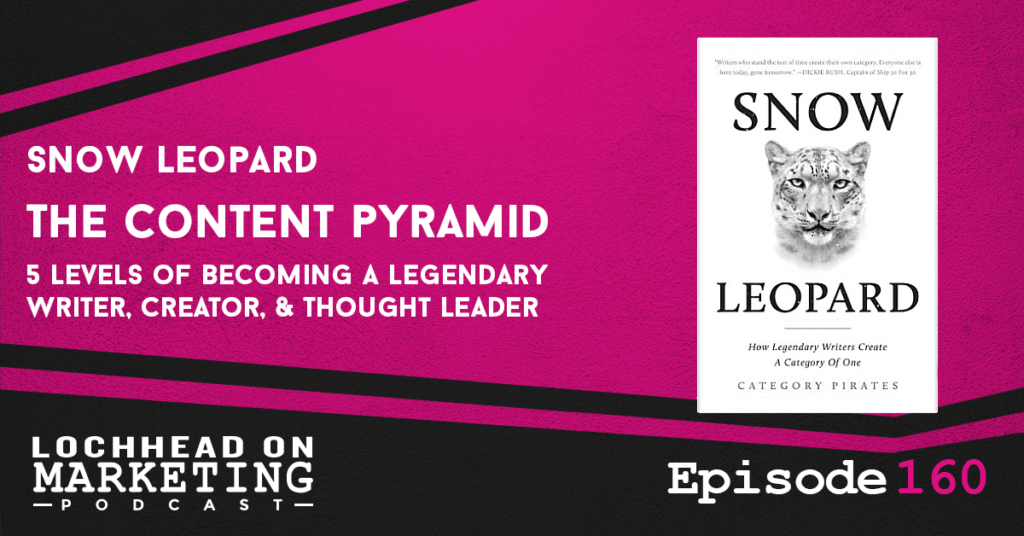
Podcast (lochheadonmarketing): Play in new window | Download (Duration: 53:39 — 36.8MB) | Embed
Subscribe: Apple Podcasts | Spotify | RSS | More
Welcome to a special episode of Lochhead on Marketing, where we dive further into our new book called Snow Leopard. On this episode, we discuss the Content Pyramid, and how one can become a legendary creator, writer, and thought leader.
But before all that, we’d like to say thank you very much to all who took the time to read our new book and share it around. It’s also caused a tremendous amount of conversation in the entrepreneur, marketing, and writer/creator world. Because today, more than ever, being able to change the world with words, matters.
Welcome to Lochhead on Marketing. The number one charting marketing podcast for marketers, category designers, and entrepreneurs with a different mind.
The Problem
Everybody wants to be a thought leader. They want to be seen as forward thinking, they want to be celebrated as the Guru, the expert, the All Knowing one in their industry, they want to be the keynote speaker, the bestselling author, the person listed in the next 10, marketers to watch in 2002 by Forbes, most of which are paid placements. Because now that the world has gotten exposed to the power of digital attention, and everyone believes the most valuable thing you could possibly have is an audience.
Well, everybody wants one for themselves. Unfortunately, as we wrote about in our mini book, The Me Disease, the vast majority of people who want to be a thought leader, or bestselling author in today’s digital gamified world, don’t have any leading thoughts. That is to say, they’re not actually contributing new differentiated ideas. What they want is to be seen as a thought leader, to collect badges of approval, and amass followers, and social metrics that send the signal that lots of other people say they are important, without having to say anything unique or meaningful, or different. More importantly, they want the audience without having to take the time to think deeply about who they are creating for and why they want the outcome without the process.
Content-Free Content
Since this has become such a desirable goal, there are now strategies for shortcutting your way to instant status gratification. The key is to cater to the lowest common denominator. The way the business world has been educated on how to become an overnight thought leader is to create content that doesn’t threaten, doesn’t challenge, and doesn’t require the audience to think, as loud and as often as possible. This strategy caters to lazy button smashing consumers.
We call this Content-free Content. It gets likes and views, and it lands you some followers. But after you the consumer, eat it, you sort of feel like a box full of Oreos. Zero nutritional value full of empty calories, and left feeling stupid.
The Content Pyramid
Ask yourself: do you want acceptance, or do you want to make a difference? If you want to be a legendary writer, creator, entrepreneur, executive or industry thought leader, you need to be honest with yourself about a how you measure success and be what category you’re going to play in.
Also, when you create you are creating something for someone. Anyone who says “Yeah, well I just want to create for myself” is a beginner and hasn’t gotten far enough down the road to realize they aren’t who matter: the reader, the listener, the viewer is who matters.
To hear the full chapter about the Content Pyramid and how to become a successful thought leader, download and listen to this episode.
Bio
Christopher Lochhead is a #1 Apple podcaster and #1 Amazon bestselling co-author of books: Niche Down and Play Bigger.
He has been an advisor to over 50 venture-backed startups; a former three-time Silicon Valley public company CMO and an entrepreneur.
Furthermore, he has been called “one of the best minds in marketing” by The Marketing Journal, a “Human Exclamation Point” by Fast Company, a “quasar” by NBA legend Bill Walton and “off-putting to some” by The Economist.
In addition, he served as a chief marketing officer of software juggernaut Mercury Interactive. Hewlett-Packard acquired the company in 2006, for $4.5 billion.
He also co-founded the marketing consulting firm LOCHHEAD; the founding CMO of Internet consulting firm Scient, and served as head of marketing at the CRM software firm Vantive.
We hope you enjoyed this episode of Lochhead on Marketing™! Christopher loves hearing from his listeners. Feel free to email him, connect on Facebook, Twitter, Instagram, and subscribe on iTunes!
288 Leadership Lessons From Taco Bell, KFC &Pizza Hut, David Novak, Founder/former CEO Yum! Brands & Author of Take Charge of You
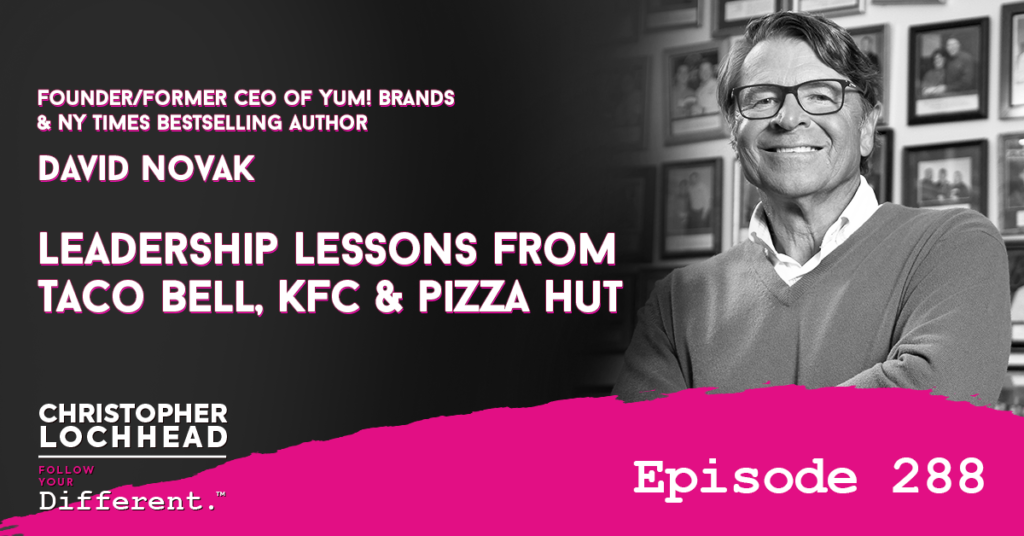
Podcast: Play in new window | Download (Duration: 1:12:08 — 49.5MB) | Embed
Subscribe: Apple Podcasts | Spotify | Pandora | RSS | More
It is said that the people who have the most legendary careers are what you might think of as other-directed. The key to a successful life is to remove your joy blockers, and the goal of a career should be to, as Warren Buffett says, dance your way to work. We talk about all these and more on Christopher Lochhead: Follow Your Different with our guest David Novak.
David Novak is the co-founder and was the CEO for 17 years of the legendary Yum! brands. Yum! is the world’s largest restaurant company, which owns Kentucky Fried Chicken, Taco Bell, and many others. David also has an amazing podcast called How Leaders Lead, and a new book called Take Charge of You: how self-coaching can transform your life and your career.
Learn how be a legendary leader, executive, and entrepreneur from the best by listening in to this episode.
David Novak on Looking Back on his Career
The conversation begins with David’s new book, and how it is a window to his career and life, and the interesting events and tidbits that go along with it.
“I was the first kid in my family to get a college education, got a degree in journalism, didn’t get an MBA, ended up becoming a CEO, and have the time of my life building a fantastic company. Now I’m in my next phase of my life where I’m fortunate enough to be able to spend time on the things that truly give me joy.” – David Novak
Nowadays, David focuses on Leadership Development, and shares his thoughts and insights in his podcast, How Leaders Lead by David Novak. He also has time to write books, which has been a big passion of his.
David Novak on Reaching One’s Goals and What Comes After
The topic shifts on how most of the books and guides in entrepreneurship that is published are focused on personal growth and development, but there are only a few on what happens when you achieve those goals. Because life doesn’t stop when you reach those goals – there has to be something else to direct your passion into.
David agrees and adds to it that after proving yourself and learning to manage and eventually lead people, the goal post shifts ever so slightly, and you find other ways to draw success.
“Well, I have to tell you, that a lot of the research out there says that, you know, the people that are the happiest are other directed. What I’ve found is that the more other directed I got, the more I focused on other people’s success more than my own, the more success I ultimately got. And, you know, it’s kind of an amazing thing.” – David Novak
On the Current State and Rising Up Again
The conversation then goes to the current state of things, where inflation and the looming threat of recession is on the rise. David comments that there is current a huge divide, particularly in the haves and have nots, especially in the environment that they are in.
That is not to say that there aren’t any people who thrive in harsher environments, but David wishes that people would at least have the chance to nurture themselves and grow.
“I hope one day, my goal is somehow from all the leadership development I do that there’ll be one person that will rise up in this country and inspire people again.” – David Novak
To hear more from David Novak and how you can take charge of you, download and listen to this episode.
Bio
David Novak, Founder/former CEO Yum! Brands & NY Times Bestselling Author
Starting with an undergrad degree in Journalism from the University of Missouri, David grew from his first job as a copywriter at a small ad agency to become a New York Times best-selling author, co-founder and former CEO and Chairman of Yum! Brands, the world’s largest restaurant company (KFC, Taco Bell, Pizza Hut), and now, founder of the non-profit organization, David Novak Leadership, Inc. and host of top-rated leadership podcast, How Leaders Lead with David Novak.
David was named “CEO of the Year” by Chief Executive magazine, one of the world’s “30 Best CEOs” by Barron’s, one of the “Top People in Business” by FORTUNE and one of the “100 Best-Performing CEOs in the World” by Harvard Business Review. And he’s passed it on. Today, there are over 26 CEOs of major American corporations that David has coached or led earlier in their careers.
Links
Connect with David Novak!
How Leaders Lead | How Leaders Lead – Twitter
Read the book: Take Charge of You
We hope you enjoyed this episode of Follow Your Different™! Christopher loves hearing from his listeners. Feel free to email him, connect on Facebook, Twitter, Instagram and subscribe on iTunes!
287 Mike Maples, Jr. of Floodgate on a New Way to Think about the Future
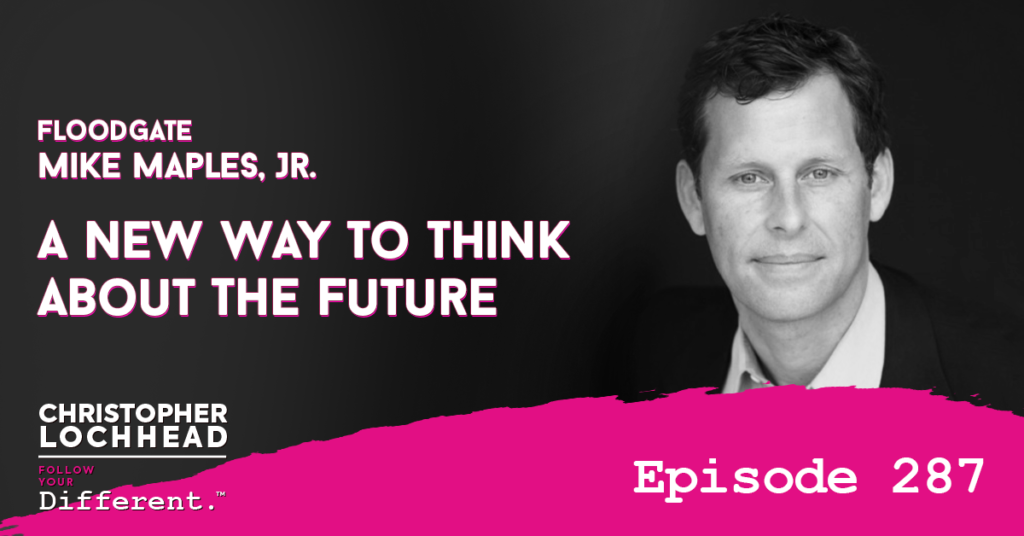
Podcast: Play in new window | Download (Duration: 1:18:48 — 54.1MB) | Embed
Subscribe: Apple Podcasts | Spotify | Pandora | RSS | More
On this episode of Christopher Lochhead: Follow Your Different, we talk about the idea of startup capital, how to have an exponential career, and maybe even a new way to think about the future with our guest, Mike Maples, Jr.
Mike Maples, Jr. is the co-founder of Floodgate Capital. Floodgate has led early-stage investments in companies like Twitter, Lyft, and much more. His podcast, Starting Greatness, is truly one of the greatest business podcasts there is.
That said, let’s get into the discussion of how to think about the future.
From Value Creators to Rent Seekers
Mike Maples, Jr. dives into the idea of the industries and business leader’s mindset and drive for creating new ideas or the lack thereof.
At the time when the animating forces behind industrial economy was mass production, mass distribution, and eventually mass computation, the focus in new technology and ideas revolved around improving performance. Over time, it evolved into developing networks, whether physical or via software, and value was derived on how vast your network reached.
Fast forward to recent years, in which Mike started noticing that there was a disconnect with most of the ideas from the founder of a company, to its current inheritors. A lot of them are starting to focus on creating a status quo, rather than moving forward. As a result, a lot of people in business make money through financial engineering rather than things that improve productivity.
“They’ve transition from being value creators to rent seekers. And they’ve started to become more interested in preserving their institutional power than in fulfilling their mission to their constituents.” – Mike Maples, Jr.
Mike Maples, Jr. on Nurturing an Economy that Rewards Productivity
According to Mike, the issue nowadays is that people make money from the market without creating new ideas, and are incentivized to do it in the current financial economy. In order to become a successful society, we need to incentivize productive behaviors to move forward.
“So hedge fund guy borrows money close to 0%, and then buys IBM stock or loans at IBM so they can buy back their own stock. And since they know they’re gonna do that they front run it. And so Okay, did any jobs get created in that? No. Did any new products get created in that? No. But people who played financial engineering games did well. And what you want is an economy that is not financialized. You want an economy that rewards productivity gains, because fundamentally all abundance and standard of living advancement comes from people being more productive.” – Mike Maples, Jr.
Engaging in fakery and keeping this charade of an economy will just lead to a cycle of economic bubbles and bursts in the future.
Startup Capitalism
If the current system won’t lend itself to shifting back to a productive economy, then the third option is to exit. Though it was not as feasible before as it is now, Bitcoin and other non-Fiat currencies have given us the chance to break free and start over, without being tied down by Fiat economies.
That said, Mike has been playing around the idea of a Startup Capitalism. As with most startups, they focus on creating a different future than just following the current flow of things. Which is why startups are born from the pursuit of new ideas, and could be the drive to a more productive economy that Mike wanted.
And you don’t necessarily need to start a new company to create a startup. It could be born inside a bigger one, much like the iPhone inside Apple.
“At the very least, you get to exercise the option of doing things in a different way. “– Mike Maples, Jr.
To hear more from Mike Maples, Jr. and his ideas on how to Rethink the Future, download and listen to this episode.
Bio
Mike Maples, Jr. is the Co-Founder and Partner at Floodgate, the host of the Starting Greatness podcast and a Co-conspirator with awesome Startup Founders.
Links
Connect with Mike!
Website: Floodgate |Twitter: @m2jr | LinkedIn: in/Maples | Podcast: Starting Greatness
We hope you enjoyed this episode of Follow Your Different™! Christopher loves hearing from his listeners. Feel free to email him, connect on Facebook, Twitter, Instagram and subscribe on iTunes!
159 Successful or Useful?: Learning from Drucker
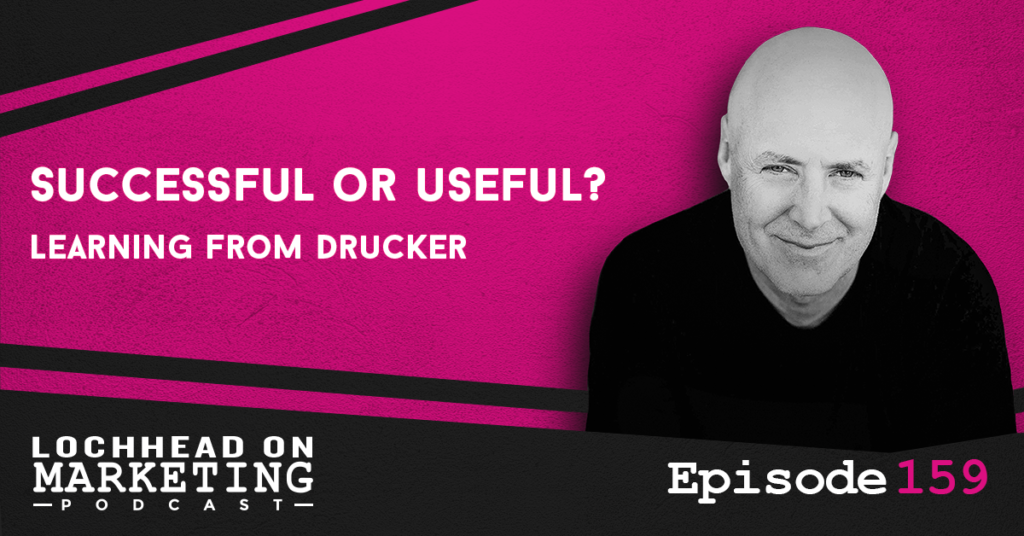
Podcast (lochheadonmarketing): Play in new window | Download (Duration: 8:09 — 5.6MB) | Embed
Subscribe: Apple Podcasts | Spotify | RSS | More
Peter Drucker is considered the father of modern business management. If there was a Mount Rushmore of business thinking, he’d be on it. Recently on Category Pirates, we’ve begun work on the evolution of Peter Drucker’s concept of a knowledge worker, to what can today be called as the emergence of an intellectual capitalist.
So I wanted to look back on Peter Drucker’s ideas that had a huge impact on me, and see if we can apply more of them in our current endeavors. His book, The Effective Executive, helped me become an organized person and an effective executive of my own. And when I read the foreword in the latest edition that was written by Jim Collins, it struck something profound, which I hope to share with you.
Welcome to Lochhead on Marketing. The number one charting marketing podcast for marketers, category designers, and entrepreneurs with a different mind.
The Effective Executive: Foreword
Here’s the foreword by Jim Collins:
My first meeting with Drucker is one of the 10 most significant days of my life. Peter had dedicated himself to one huge question: how can we make society both more productive and more humane?
His warmth, as when he grasped my hand in two of his upon opening his front door and said, “Mr. Collins, so very pleased to meet you please come inside”, bespoke his own humanity. But he was also incredibly productive. At one point, I asked him which of his 27 books he was most proud of, to which Drucker, then 86, replied, the next one. He wrote 10 more.
At the end of the day, Peter hit me with a challenge. I was on the cusp of leaving my faculty spot at Stanford, betting on a self-created path. And I was scared.
“It seems to me you spend a lot of time worrying about how you will survive”, said Peter. “You will probably survive”, he continued, “and you seem to spend a lot of energy on the question of how to be successful. But that is the wrong question”. He paused. Then, like the Zen master thwacking the table with a bamboo stick, “the question is, how to be useful.” A great teacher can change your life in 30 seconds.
I know that there have been moments in my life where I wondered if I was going to survive or make it. And the interesting teaching here that Jim is sharing with us from Peter, is that when we turn our effort, our focus on being useful to others, ourselves become less important.
So if you’re somebody right now, who’s wondering how to be successful or worried that maybe you won’t survive, or maybe that your startup or your career is on the wrong path. I would just underscore the story, you’ll probably survive. Like Peter said, the real question is, how can we all be useful?
Bio
Christopher Lochhead is a #1 Apple podcaster and #1 Amazon bestselling co-author of books: Niche Down and Play Bigger.
He has been an advisor to over 50 venture-backed startups; a former three-time Silicon Valley public company CMO and an entrepreneur.
Furthermore, he has been called “one of the best minds in marketing” by The Marketing Journal, a “Human Exclamation Point” by Fast Company, a “quasar” by NBA legend Bill Walton and “off-putting to some” by The Economist.
In addition, he served as a chief marketing officer of software juggernaut Mercury Interactive. Hewlett-Packard acquired the company in 2006, for $4.5 billion.
He also co-founded the marketing consulting firm LOCHHEAD; the founding CMO of Internet consulting firm Scient, and served as head of marketing at the CRM software firm Vantive.
We hope you enjoyed this episode of Lochhead on Marketing™! Christopher loves hearing from his listeners. Feel free to email him, connect on Facebook, Twitter, Instagram, and subscribe on iTunes!
158 Crossing the Chasm & 22 Immutable Laws of Marketing: Through the Category Lens with Matt Johnson of the One Book That Changed My Life Podcast
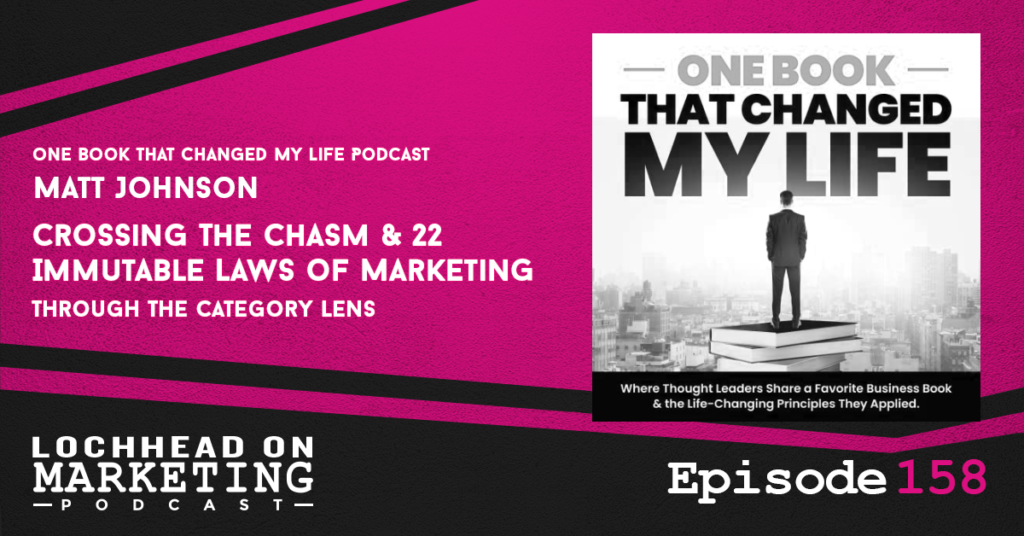
Podcast (lochheadonmarketing): Play in new window | Download (Duration: 54:29 — 37.4MB) | Embed
Subscribe: Apple Podcasts | Spotify | RSS | More
On this episode of Lochhead on Marketing, Matt Johnson and I have a conversation about the book that changed my life. In my case, it was two books in particular that changed my life. We look into them through a category lens perspective in Matt Johnson’s new podcast, One Book That Changed My Life Podcast.
Matt Johnson is the founder of PursuingResults.com. Matt and his firm were the original producers of my original Oddcast back in the Legends and Losers days, and he’s taught me a ton about podcasting. He’s got a legendary podcast called MicroFamous. Of late, he started a new podcast called one book that changed my life.
Welcome to Lochhead on Marketing. The number one charting marketing podcast for marketers, category designers, and entrepreneurs with a different mind.
Matt Johnson & Christopher Lochhead on how the two books made a difference
After a brief introduction of who Christopher Lochhead is and his works, Matt Johnson starts the discussion on the book. Particularly on the topic of what the situation was when he was reading the books for the first time, and how it affected Christopher and his views.
Christopher then talks about his background when he was first starting out his business as an entrepreneur and still learning the ropes. While there were a lot of books on marketing available, there was something about the 22 Immutable Laws the made him think, “this is the one.”
“I started to read them early on, and, and it immediately spoke to me. What their work really spoke to was, if you want to stand out, if you want to be super successful, and you want to make a big difference, you got to do it by being kind of radically unique in some way.” – Christopher Lochhead
Matt Johnson & Christopher Lochhead on the 22 Immutable Laws
Of the topic of the 22 Immutable Laws book, the one law that really stood out to Christopher was the 2nd law, which is the Law of Category. It states that, “if you can’t be first in the category, then set up a new category that you can be first.” Looking back, that law describes Category Design quite nicely.
Christopher also brings up the idea of the importance of solidifying and codifying your ideas and defining them as a category, rather than just sharing new thinking without establishing it first. Because it leaves others the chance to improve upon it and move into the category before you, and by then you’ve lost the category despite being the actual first to think about it.
Matt Johnson & Christopher Lochhead on Crossing the Chasm
As for Crossing the Chasm, Christopher explains that the book presents a great framework for understanding how new markets in tech, and in these days, pretty much all digital-related markets.
The book explains how new market categories develop. It has a standard kind of bell curve which introduces a non-obvious problem that anybody who’s introduced a new tech category has experienced, but had no lens or way of understanding the concepts.
On the side of the rising bell curve, you have the few innovators, followed by the slowly increasing number of early adopters. At the peak, you have the early majority, who mostly benefit from the experiments and not repeating the same mistakes as early adopters might have incurred. Then you have the downward slope, which features the late majority and the laggards who are late to the party.
To hear more from Matt Johnson and the rest of the podcast, download and listen this episode.
Bio
Matt Johnson is a marketing agency founder, podcaster, and musician. He runs a podcast launch & production agency based in San Diego, an international team that helps business coaches, consultants and thought leaders use done-for-you podcasting to attract an audience, build influence & become MicroFamous.
Matt is the author of MicroFamous and currently hosts the MicroFamous podcast. He is a frequent podcast guest and event speaker to audiences around the US, Canada, and Australia.
Links
Connect with Matt Johnson!
PursuingResults.com | One Book That Changed My Life Podcast | MicroFamous
We hope you enjoyed this episode of Lochhead on Marketing™! Christopher loves hearing from his listeners. Feel free to email him, connect on Facebook, Twitter, Instagram, and subscribe on iTunes!
286 How Category Designers Create The Future with Lauren Dunford of Guidewheel & Kevin Maney of Category Design Advisors

Podcast: Play in new window | Download (Duration: 1:09:54 — 48.0MB) | Embed
Subscribe: Apple Podcasts | Spotify | Pandora | RSS | More
On this episode of Christopher Lochhead: Follow Your Different, our guests Lauren Dunford and Kevin Maney discuss how Category Designers work to create the future. On this topic, we also talk about how do you create a company that makes a difference and makes money at the same time.
Lauren Dunford is the cofounder and CEO of an extraordinarily exciting new company called Guidewheel. They are a mission to empower all the world’s factories to reach sustainable peak performance.
Kevin Maney is a legendary bestselling author and award-winning columnist. He’s also the co-founder of Category Design Advisors, where he helps companies create and dominate new market categories. He is also one of the co-authors of Play Bigger, and one of the Godfathers of Category Design.
If you care about building companies that changed the future, I think you’re gonna love everything about this episode.
Lauren Dunford and Kevin Maney on Category Design
The conversation starts off with an explanation on how Lauren Dunford and Kevin Maney met, and the work they have done together on category design.
Kevin knows Lauren from the work they have done on the category design project on Lauren’s company, Guidewheel. Kevin was really interested with Lauren’s work, as he explained:
“There are actually two tracks of reasons that I very interested in Lauren, and her company guide wheel and one is the category design aspect, which I feel like was a very exciting project. But then also, there’s another track of the book that I wrote that came out earlier this year called Intended Consequences.
The idea behind that book was that there’s been lots of conversation out there about responsible innovation and how a company’s ESG had companies to do good and everything. And hang on. And we were talking about the fact that there wasn’t really a real playbook for like, if you wanted to start a company that was like this.” – Kevin Maney
As he was writing the book, Kevin realized that a lot of conversations he had with Lauren Dunford line up with the ideas that they were talking about in the book; mainly how to setup a company that from the beginning, will be a company that is profitable and does something really good.
Lauren Dunford on Guidewheel
We then pivot to a discussion on Lauren’s company, Guidewheel, and the work they are doing to make the business a force for good.
Lauren and her co-founder were undergrads in Stanford, where they ran competing climate change groups. Afterwards, they consolidated their efforts and aimed to create a profitable business objective that still had a massive impact on climate change.
“We work with factories, and the category we’re building is Factory Ops. Our goal is let’s have all of the world’s 10 million factories, having the tools to reach sustainable peak performance, if we can do that at scale huge for their businesses. And then, of course, your massive impact for the planet because of how much emissions results from how we make those guitars and everything else on the planet.” – Lauren Dunford
Lauren describes the category of Factory Ops as making the tools of the biggest factories run efficiently, so there are less waste and by-products. This in turn meant that companies will have the same, if not more, output while contributing less to factors that cause climate change.
To hear more from Lauren Dunford and Kevin Maney on how to create a company that makes a difference and makes money at the same time, download and listen to this episode.
Bio
Lauren Dunford
Lauren Dunford is the co-founder and CEO of Guidewheel, on a mission to empower all the world’s factories to reach sustainable peak performance and recognized by the World Economic Forum as one of the 100 most promising companies globally poised to have a significant impact on business and society.
Kevin Maney
Kevin Maney is a bestselling author and award-winning columnist. He’s also the co-founder of Category Design Advisors where he helps companies create and dominate new market categories.
He has been writing about technology for 30 years, has interviewed most of the tech pioneers you can name, and brings broad and deep context to Category Design conversations.
He is co-author of the book Play Bigger, and has been an A-list writer and thinker about technology for 25 years.
Kevin’s most recent book is UnHealthcare: A Manifesto for Health Assurance, which proposes a new category of healthcare. It is co-authored with Hemant Taneja of General Catalyst and Stephen Klasko, CEO of Jefferson Health.
Kevin and Hemant also co-authored the 2018 book Unscaled: How AI and a New Generation of Upstarts Are Creating the Economy of the Future.
His other books include The Two-Second Advantage (a 2011 New York Times best seller), Trade-Off: Why Some Things Catch On and Others Don’t, and The Maverick and His Machine: Thomas Watson Sr. and the Making of IBM.
Kevin wrote a regular column for Newsweek, and has been a contributor to Fortune, The Atlantic, Fast Company and ABC News, among other media outlets. He was a contributing editor at Conde Nast Portfolio and for 22 years, Kevin was a columnist, editor and reporter at USA Today.
Links
Connect with Lauren Dunford!
Guidewheel | LinkedIn | Twitter
Connect with Kevin Maney!
Category Design Advisors | LinkedIn | Twitter
We hope you enjoyed this episode of Follow Your Different™! Christopher loves hearing from his listeners. Feel free to email him, connect on Facebook, Twitter, Instagram and subscribe on iTunes!
157 How Category Contenders Become Category Leaders with Al Ramadan, Co-Author of Play Bigger
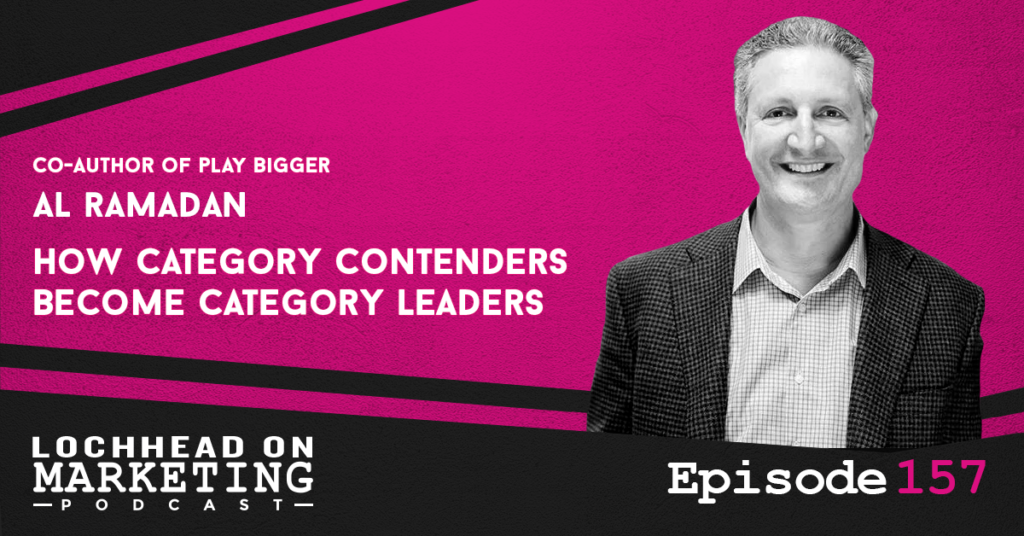
Podcast (lochheadonmarketing): Play in new window | Download (Duration: 1:12:12 — 49.6MB) | Embed
Subscribe: Apple Podcasts | Spotify | RSS | More
On this episode of Lochhead on Marketing, our guest Al Ramadan talks about what’s at stake when it comes to category battles, how you can spot the category challengers who can become category kings and queens, and what they need to become category leaders that earn 76% of the economics.
There comes a time in every startup’s life, where they face an epic, typically 18-to-36-month category battle. As we reported in our first book Play Bigger, the company that wins that battle earns 76% of the total value created in the category as measured by the market caps for public companies and valuations for private companies. What that means is, in any space, one company earns two thirds of the economics, which makes that category battle, which is typically 18 to 36 months long, arguably the highest stakes game in business.
This episode will be available on both Christopher Lochhead: Follow Your Different and Lochhead on Marketing, because we think it is that important that everyone must hear about it. So without further ado, let’s dive into this dialogue.
Play Bigger: Looking back, and its impact today
Al Ramadan comes into the conversation bearing data about the businesses and companies we’ve observed when writing Play Bigger, as well as some new players that have achieve the same feat since then.
To recap, Al Ramadan and Christopher Lochhead wrote a book back in 2014 called Play Bigger, which talks about category design and how it can make you become a category leader in your chosen space. One of the things they’ve found out in the course of their research is that Category Leaders tend to corner 76% of the value of said space.
Though when they wrote Play Bigger, the world was nowhere near as digitized as it is today. So a lot of the research was based on tech companies back then. But now, as more and more categories are behaving like tech categories due to digital scalability and digital reach, these findings are becoming true for every category.
Category Kings to Category Leaders
Al Ramadan shares that he and his team looked into the 35 Category Kings that they have observed back in Play Bigger, and check on their current situation in the market sphere.
In Play Bigger, we originally published a set of research and tracked 35 Category Kings in the tech space and their market caps at the time were 465 billion and those same companies today are now worth 1.9 trillion.
“If you track what happened to those 35 kings, as we call them back then, between the year of 2014 to the year of 2021. You want to know what the numbers are? At the time in 2014, the entire pool of the 35 category kings were valued at 465 billion. They are now valued at 1.9 trillion. That is, they’ve created more than $1,000,001.5 in market cap and the annual for those people who care about this stuff like Investors and Financial people. The compound interest growth rate of those kings. Market cap wise, is 22.46%.” – Al Ramadan
Given this data, it begs the question of how many understand that this is the new dynamic, and how many entrepreneurs and marketers still think that it’s a big leap of faith to follow.
To hear more from Al Ramadan and how Category Kings can become legendary Category Leaders, download and listen to this episode.
Bio
Al Ramadan is a co-founding partner of Play Bigger Advisors and coauthor of the book, Play Bigger. He also co-founded Quokka Sports, which revolutionized the way people experience sport online.
Al then joined Macromedia and Adobe, where he spent almost ten years changing the way people think about great digital experiences. At Adobe, Al led teams that created the Rich Internet Applications category and helped develop the discipline of experience design.
In the early ‘90s he applied data science to Australia’s Americas Cup — an innovation in sports performance analytics. His work in sailing led directly to the idea for Quokka. He lives in Santa Cruz, California.
Links
Connect with Al Ramadan!
Play Bigger | LinkedIn | Category Contenders
We hope you enjoyed this episode of Lochhead on Marketing™! Christopher loves hearing from his listeners. Feel free to email him, connect on Facebook, Twitter, Instagram, and subscribe on iTunes!

